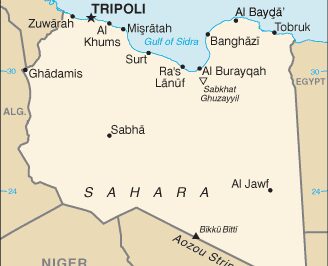
According to Reuters, Gaddafi’s tanks shelled Misrata—the last rebel-held town in the west—on Tuesday night. The Associated Press reports that Gaddafi’s forces had been patrolling the streets in Misrata, filling the city with tanks and snipers all day. Four children were killed in a civilian car.
The situation is growing increasingly grave for Libyan civilians. A Libyan dissident was in touch with his father who lives in Misrata. He told the Associated Press that people are living off canned food and rainwater tanks and have virtually no access to communications or electricity.
The fluid situation continues to change and grow from minute to minute. U.N.-sanctioned attacks have added to the fighting, but it is unclear how long they will remain. Many are beginning to suspect that the conflict may be slow in ending.
Libyan civilians are no doubt frightened and increasingly desperate. SAT-7, a satellite television service for Christians in the Middle East and North Africa, is doing its part to encourage them in the name of Christ.
“We want to show the church in action, the church responding, the church praying, and the church doing things to bring God’s light and His hope and His love in these kinds of situations,” explains David Harder, communications manager for SAT-7. SAT-7 has done likewise in other countries experiencing unrest, and is asking the church to be the main encouragers of believers living in Libya and other volatile countries.
“As we around the world are watching the events very closely in Libya—but also in Bahrain where demonstrations have been quashed, and things are happening in Yemen and also in Morocco and Algeria—we’re watching these things very closely,” Harder says. “But we’re allowing the Arab church in the region to speak into the situation; to speak about their hopes, their prayers, their concerns, and how followers of Jesus should react to these kinds of things, whether they’re in the midst of them or whether they’re watching from nearby.”
SAT-7 consistently calls all of its viewers to prayer for Libya and for the believers who have been isolated there. SAT-7 is also in touch with churches who are responding right on the ground. Harder says several churches are helping Libyan civilians at the Tunisian and Egyptian borders. SAT-7 teams on the borders have been able to cover how churches are responding.
The violence and uncertainty occurring in Libya are frightening at best, but SAT-7 is providing hope to those who are able to access it, along with a vital call for prayer. SAT-7 boasts nine to 10 million viewers—an enormous potential for prayer.
Harder says, “Pray for a quick and just resolution for the situation in Libya, and that, throughout the region, the results of these events would be for greater freedom for all people—especially for the sake of the cause of Christ.”







Leave a Comment
You must be logged in to post a comment.